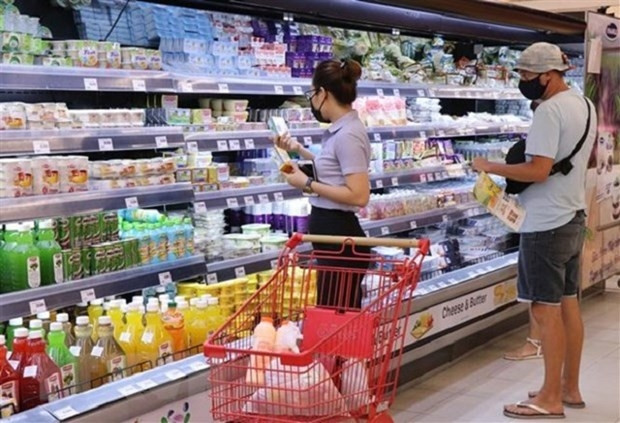According to the General Statistics Office (GSO), the nation's total revenue from retail sales of goods and services surpassed 477 trillion VND (20.7 billion USD) in May, up 4.2 percent on the month and 22.6 percent on the year. The growth on year reached a higher rate in the years before the pandemic.
According to GSO, the total revenue from retail sales of goods and services surpassed 2.25 quadrillion VND in the first five months of 2022, up 9.7 percent year-on-year.
The revenue from retail sales of consumer goods increased by 9.8 percent over the year, with revenue surging by 13.1 percent for food, 12.8 percent for cultural and educational products, and 3.1 percent for transport.
Meanwhile, the revenue from accommodation and catering services in the first five months rose by 15.7 percent. The high demand of domestic tourists and the SEA Games 31 helped revenue in May increase by 69.3 percent over the same period last year.
Localities having growth in the revenue from accommodation and catering services were Can Tho (39.7 percent), Hanoi (34.2 percent), Dong Nai (22.6 percent), Quang Ninh (17.3 percent), Hai Phong (10.5 percent), Binh Duong (11.4 percent) and Da Nang (11.2 percent).
The strong recovery of tourism activities and the 31st SEA Games increased the travel and tourism revenue in the first five months of 2022 by 34.7 percent over the same period last year.
Localities having growth in the revenue from travel and tourism included Khanh Hoa (347.6 percent), Can Tho (88.2 percent), Phu Tho (80.6 percent), Quang Nam (67.8 percent), Hanoi (61.1 percent) and Quang Binh (29.6 percent).
When export activities have faced many difficulties from fluctuations in the market, increases in sea freight and prolonged transportation time, some small and medium-sized enterprises have been returning to the domestic market.
As a small and medium-sized enterprise in the agri-food industry, Surifarm Organic Vegetables Co., Ltd., based in HCM City, sees a huge potential in the domestic market for small and medium-sized enterprises, said To Huynh, a representative from the company.
According to Huynh, 90 percent of the company's revenue has been from the domestic market, while only 10 percent of its revenue has come from exports.
He said exports face many difficulties from high sea freight and congestion at international seaports.
Meanwhile, agricultural and food products are still essential products on the domestic market, although consumers have tightened their spending due to the pandemic.
"Despite the difficulties from the pandemic, the domestic market of the food industry is still quite good. During the outbreak period of the pandemic, many businesses in this field operated efficiently and even expanded their market shares. Now that the pandemic is controlled, opportunities for small and medium enterprises will open up," Huynh told VnBusiness.
Nguyen Hoang Dat, director of Vinahe Co. Ltd., an enterprise in Binh Phuoc province specialising in cashew nut production and processing, said exports were now a challenge for the company.
The company continues to focus on the domestic market even though there are periods of slow production due to the pandemic. Now, sales from domestic supermarket chains account for about 90 percent of the company's total revenue.
According to experts, when focusing on the domestic market, businesses need to pay attention to local consumer confidence in their products.
Domestic consumers now have more and more information about products, brands and services, and their needs are also increasingly demanding.
Therefore, in the long term, small and medium enterprises need to have strategies to enhance the quality of their products and services and produce according to the market's needs.
















